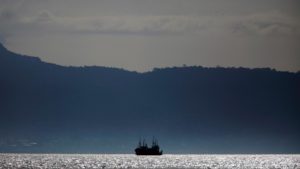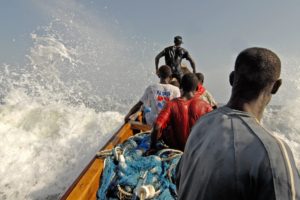Chinese control is widespread in Ghana’s industrial fishing fleets despite national legislation prohibiting foreign ownership, a new study claims.
Operating through “front” Ghanaian companies, over 90% of Ghana’s industrial trawl sector is now linked to Chinese firms, the London-based Environmental Justice Foundation said. Some of these deals include hiring purchase agreements, where the license holder pays part of the acquisition price of the vessel upfront and the remaining amount in installments over a period of time. Chinese nationals also captain the majority of these vessels, and given the “opaque” proprietorship arrangements are able to avoid scrutiny from officials.
All this is in contradiction to Ghana’s Fisheries Act of 2002, which prohibits, with a few exceptions for tuna, all foreign industrial or semi-industrial vessels from fishing in Ghanaian waters. Officials in Accra decry these backdoor transactions, yet EJF notes that fines paid out in settlements remain “significantly less than the minimum” stipulated in the law.
The new revelations are pivotal given the importance of fishing to Ghana’s economy and how the poor protection of the sector is hurting fishing communities. Over two million Ghanaians, many of them artisanal fishers, are dependent on fisheries for their livelihoods, according to the Food and Agricultural Organization. Yet, decades of over-exploitation by both small-scale and industrial fleets have pushed stocks of some key species, such as sardinella, to the brink of collapse.
This has especially been true of ‘saiko’ fishing, a traditional barter system which involves the trans-shipment of frozen blocks of fish from industrial trawlers to canoes out at sea. EJF says the Chinese-manned vessels are engaged in this practice despite it being illegal, leading to depleted stocks, decreasing income for fishers, and putting food security and livelihoods in danger.
China is the largest fishing power in West Africa with many of its flagged trawlers caught engaging in illicit practices. Cognizant of this, Beijing has been trying to rein in vessels engaged in illegal, unreported and unregulated (IUU) fishing by canceling subsidies and revoking their licenses. In West Africa, the problem is also exacerbated by poor government collaboration, weak laws, besides the lack of a comprehensive database on fishing boats and trawlers, leading to over $2 billion in annual loses according to one estimate.
However, Chinese companies aren’t the only culprits in West Africa. Research from last year showed that European members states including Greece, Italy, and Spain unlawfully authorized their vessels to fish off the waters of The Gambia and Equatorial Guinea.
–
Credit: qz.com/africa





